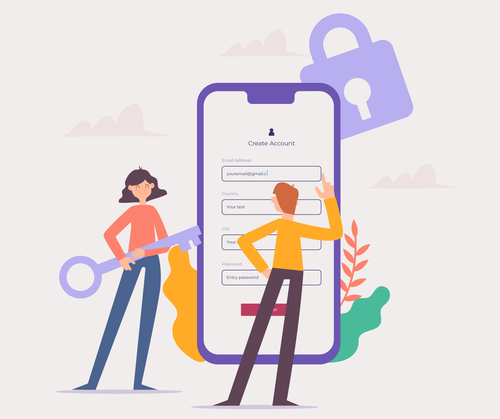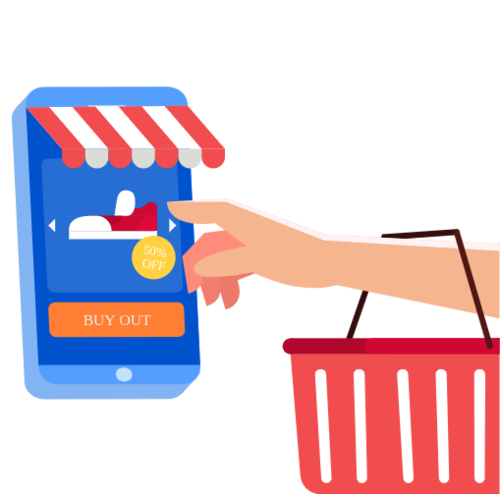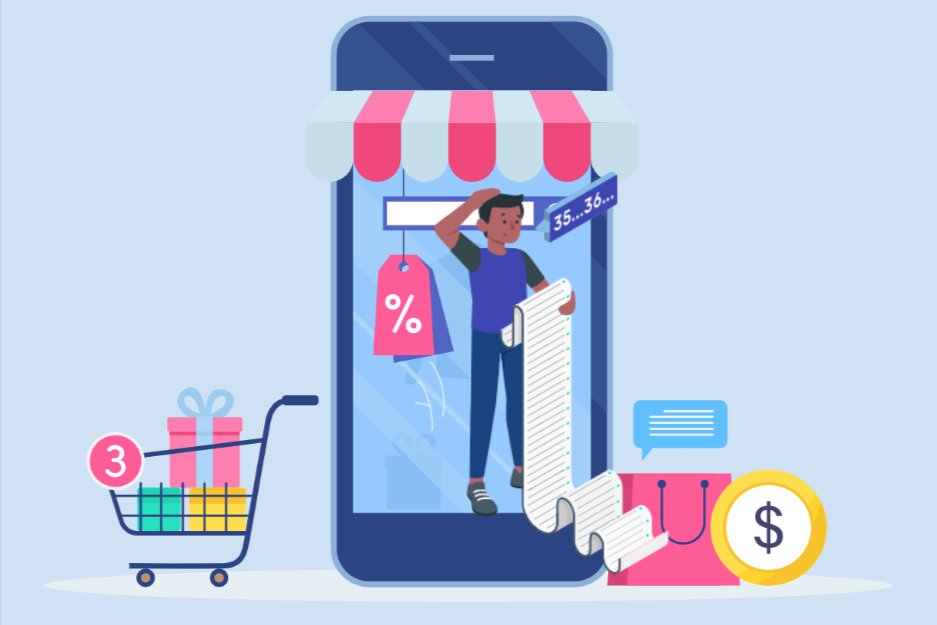Ecommerce mobile apps are a modern customer magnet and it’s no longer a secret. Even if your target base is internationally spread, the easiest way to make them familiar to your brand is by getting on their phones ! Ahead goes all else that you need to know about the process.
Does the thought of getting to shop everything from breakfast cereal to beauty essentials online amaze you anymore?
Clearly not, when an 8 year old tracks her stationary delivery herself & a non tech-savvy 80 year old can opt for express delivery of his must-have pill at the 11th hour.
Needless to say how fast technology is evolving and so, to hold onto competitive advantage, contemporary businesses must rethink their online strategy to impress customers in newer ways, while keeping pace with cutting-edge technologies. Sensing the market pulse much before, the biggies on the ecommerce block were quick to resort to eCommerce mobile app development. True that developing an ecommerce mobile app comes with its own set of challenges, but if you are guided by the master of this trade, turning the app challenges into a cakewalk becomes easier than it otherwise is.
Get Complimentary Ecommerce App Consultation
How?
Get scrolling for a 360 degree view of mcommerce essentials!

Why go for an eCommerce App if there's already an eCommerce Website?
Ecommerce and app – both the words have ‘bread and butter’ sort of familiarity if taken individually, however some of the industry insiders are still confused whether an ecommerce website development is sufficient or an ecommerce mobile app is an absolute must.
Watching your buck is always good and knowing why it’s beneficial to go with certain flows (read, mobile commerce trend! ) is even better!
Let’s do a quick questionnaire for some hints to begin with.
If you are asked to delete all the apps from your phone and keep just one, what would that app be?
The question isn’t just difficult, it’s very close to impractical to say the least.
From our cheesecake craving at 12 to our cab urgency at 8, an app is where our brains head straight to, these days.
Isn’t that enough of a signal that where your clients are available during most number of waking hours?
Pretty evidently on their phone and so, with an ecommerce app dedicated to your business, you reach where they can find you easily.
Estimate your ecommerce mobile app development cost in minutes!
Why (Or, If At All! ) Your Business Needs an eCommerce app?
When it comes to the business scenario ‘One Strategy Fits All’ isn’t even a thing, right ? The reason is simple – the business model changes and so does the target audience base. Thus, not the same solution works for all. So before you get to the end only to realise mobile commerce will add zero value to your business, let’s glance through the checkboxes to know whether or not an ecommerce app will be your ‘best bet’ !
.jpg)
[1] A decent share of your customer base is always on-the-go
Is your responsive website really as responsive as your customers would like it to be? Probably not.
Doesn’t the browser force your customers to log in every time they want to come and see your e-store?
But an ecommerce app knows what the customers-on-the-go like better, thus, stores their details within the app and allows them to visit at one click after their first sign in (unless they choose to log out) !
If a chunk (if not the entire) of your target customers include students, youngsters, working professionals and alike, chances are there, they wouldn’t open their laptop or desktop just to place an online order. On the contrary, an ecommerce mobile app won’t eat up a few minutes of their precious time asking them to sign in every time they visit. Clearly, they will choose convenience. So, the long story cut short, a responsive website sure gets your ecommerce business started but mcommerce really seals the deal.

[2] Taking customer experience from ordinary to extraordinary is in your immediate checklist
Remember how we slowly sacrificed our regular mall trips and became online shopping loyalists? Bet you do!
Ease was the reason, as online shopping didn’t require us to get out of PJs or carry big bags home..oh and get the big fat discounts at the comfort of our couch!
So, the above discussion boils down to the fact that we shift towards easier choices when there’s not much difference in terms of quality of products & services.
Thus, the point is, you have to make your customer’s lives easier, and leveraging native capabilities through your ecommerce mobile app, is a good starting line. Integrating inbuilt mobile features (like cameras & GPS) with app specific features ( like offline functioning) enable the user to experience the purchase in a more practical yet convenient way. Also, the concept of interactive shopping using the emerging twin tech AR & VR is something a website can’t embrace well yet (at least not to the extent that mcommerce can!).
Read More : How to Develop an Online Reputation Management Software

[3] Brand recognition is your bird’s eye
Think of your happy customers referring your brand to others – great right?
But you can’t force them to do so and most of the time you won’t even know if they are actually talking about you!
But there are marketing tricks that can make them do the word-of-mouth-marketing for you, all you need to do from your end is run a referral campaign & treat them with some discounts!
Wondering if that’s an effective way?
Here’s a bit of stats that can help – Customers acquired through referrals have a 37% higher retention rate and 81% of consumers are more likely to engage with brands that have reward programs !
There’s more, flashing a hi (basically, a push notification planned well) to them even when they are out of your ecommerce app, maybe just fiddling with the phone during a midday coffee break, goes a long way ensuring you are not out of their minds when you are out of sight.
Enough logic for how you opening a “Man Crates” mail during an off season, joining the #OptOutside campaign by REI at Twitter is actually the brands’ making space in your head before you get hands on their stuff?
Yeah, mobile commerce plays the trick there !

[4] You want to magnet your customers so that they stay loyally yours
Customers have about a hundred options lying at their fingertips when it comes to online shopping. Thus, just stocking good products may be enough to convince them for a purchase but gluing them to your brand is one real task. Worry not, we’re not leaving the brainstorm up to you and sharing a few strategies that our clients ( from cutting-edge startups to Fortune 50 ) seemed to have reaped clear benefits from! Retention, certainly, is the new growth and what better way to do that than an ecommerce app developed well. With the ecommerce mobile app, mutually win-win loyalty programs (savings for them, increased sales for you!) based on a more grassroot level customer segmentation is a breeze.

[5] You want the products to transit from the ‘carts’ to ‘checkout’ more frequently
Abandoned carts are nothing less than nightmares for the ecommerce businesses and among other reasons behind it, a complex checkout process happens to be a common cause. So, a seamless checkout is just as important and an ecommerce app makes that possible! With micro interactive app experience along with a smooth checkout, your ecommerce app can bring you more business than your website ever will.
Ecommerce Mobile App Trends – Up-Close
Trends are the buzzword in today’s time & especially in the ecommerce context it holds great significance. Highlighting only the fab ones from the recent ecommerce mobile app trends – take a note !

1. Lesser click = Better Sales
The contemporary ecommerce customers lead a fast life and they’re a sucker for convenience. Each click may seem like a fraction-of-second’s affair, but accumulated together, becomes a fairly decent amount of time, at least enough to annoy your customer away! Thus, well-optimized least number of clicks is the current trend in the m commerce space.

2. Voice Shopping
On to another point while sticking to the same logic : ‘convenience’ – using voice instead of the tiring “typing – navigating – searching through precise categories” process. So that makes voice shopping the hotspot in the mobile commerce space.

3. Chatbot Support
A tech innovation that combines the empathy of human touch with the efficiency of automation – any point to NOT be a trend ? None, true ! So with the ability to drastically reduce response time, chatbot support turns every business’ expectation into reality !
.png)
4. Crypto Payments
e-Wallets are no longer a ‘newbie’ in the payment space as a big chunk of the target shoppers have advanced enough to opt for ‘payment via cryptocurrency’. From bitcoin to litecoin to ethereum and more – the chances are endless. Consider offering them as payment options on the mobile version of your ecommerce store, and encourage people to use their mobile crypto wallets to purchase products.
.png)
5. Social Commerce
Where there’s a social media platform, there’s people and certainly, your target audience too ! So with the power to reach a wider audience with not much of extra efforts – social commerce has become an integral part of the ecommerce app ecosystem.

6. Livestream Shopping
‘Influencer activities’ and ‘new arrivals’ are what the shopaholics are always keeping an eye on & it’s no secret ! This ecommerce app trend called ‘livestream shopping’ utilizes exactly that emotion. For every time the customers like what the model is wearing or something from the new arrival launch session – they can order it right away!
Points to remember when developing an eCommerce App

[1] Security First – Risks are worth taking when chosen, not imposed!
There’s no denying that the entire point of ecommerce app development is to bridge the gap between users' requirements and manufacturers’ products. However, the app in discussion will be a risky and potentially damaging place without proper security enforcement. Most obviously, no one puts their personal data at risk in the name of convenience. To ensure your customers turn to your ecommerce app in their needs, you have to guarantee that the shared confidential information starting from shipping & billing address to contact details, from digital payment details to purchase history, every bit of it is protected.
“Easier said than done” is that what just struck your mind?
Private data leakage surely is one of the biggest haunting woes in the current software industry but there’s always a way (and a quite a few hacks! ).
Thanks to the boon of mcommerce – modern encryption technologies and well established data security standards like PCI, FIPS etc. that have enabled concrete security within ecommerce apps, closing all possible doors for data theft. The best part is, there’s an option for every realistic budget to make an app “hard to hack”. Don’t forget over and above every feature and functionalities, security is one element that you can’t afford to ignore as a breach can jeopardize your well built business in a matter of seconds.

[2] Make It Scalable – A Mere Storm Shouldn’t Knock Your App Down
How would you feel when your fellow business owner is out of time managing profit from the Black Friday sale and you are busy managing your app that crashed during Black Friday due to lesser user handling capacity?
We understand.
For an ecommerce business, growth is measured on a year-to-year basis & given that, there’s almost day to day chances of increase in virtual footfall. In such a condition, preparing your ecommerce app to run smoothly when the number of visitors increases, is a must.
Depending on how your business processes are planned, the answer to “What module to keep as scalable?” will vary. For instance – while some need to focus on the accounts module, some need to work on production management. Going by the saying “Prevention is better than cure” – it is better to train your app with an excessive range beforehands than dealing with a surprise frozen application.
And to take care of overall m commerce infrastructure scaling you now have lots of options starting from ever trusted Amazon AWS to Microsoft Azure to Google GCP and many more.

[3] Ensure Stability – To Stay (and not fade away like another Mayfly app), Be Sta(y)ble!
Stanley probably wouldn’t die soon if he doesn’t have some cake (Remember The Office, Season 4), for real, but your app can, if it misses out on stability! Reason? Who would waste time over an app that lacks balance and behaves weird!
Now the question is how to build an app that’s perfect and doesn’t have a single flaw? No, that’s not the goal either, what is to be built is the closest to perfect. Multiple QA tests, considering feedback, updates after regular intervals, and an ongoing improvement process works just fine. While repeated iterations may seem mammoth time consuming, but there’s no shortcut to a seamless functioning mobile commerce.
.jpg)
[4] Don’t Miss Out On Style
What if colorful books with animated characters were for astronomy researchers and thick hardcovers were handed to infants? I know, sounds crazy! Doesn’t that speak a lot about how choosing style and layout is important for an ecommerce mobile app? Basically, it has to be visually appealing yet intuitive in terms of usage. That means, design shouldn’t be the concern over usability, instead, the app should have a fair blend of both.
A Comprehensive Checklist For eCommerce App Features
An ecommerce app is a product-type agnostic business growth catalyst without a doubt, but choosing the right set of mcommerce features can be overwhelming! Here’s a list of the must have features that will make your app wholesome.
- Effortless login & quick registration
- User-friendly items filtering and sorting options
- On-point product descriptions
- Precise Product gallery
- 360-degree product view
- Smart shopping carts
- Convenient Shipping options
- Editable till checkout order summary
- Multiple easy yet secured in-app payments
- Quick returns and easy refund
- Exchange option with tracking
- Unprocessed cart reminders through mails and push notification
- Checking item availability with zip code matching
- ‘Back In Stock’ reminder
- Notification Regarding Wishlisted Items
- Customized product recommendations & item feeds
- App insider schemes
- Loyalty programs and gift cards
- Flash sales and occasion-oriented offers
- Easy & efficient customer service & live chat support
- Product ratings and reviews
- In-app barcode scanner
- Smart product search using text, image and voice
- ‘Refer to a friend’ candies
- Social media link integration
Not digging into the features deep now, since we have already talked about it to the T here, so moving on to the next segment!
Do’s & Don’ts Of eCommerce App Designing
Even the good things become ‘good for nothing’ if not implemented the right way! Here’s a quick (what) to do or not to do guide so you don’t damage your ecommerce app “do”ing a strict “don’t”. Keep noted!

[1] Registration
(DO) Keep It Simple, Smarty!
[a] Enable guest login, so you don’t lose customers who are in search to grab stuff on-the-go bypassing the account creation process or the login hassle for that matter!
[b] Make sure your authentication process doesn’t force them to dive deep into their mailbox, instead, let them get verified through mobile OTP.
(DON’T) Going OTT isn’t the way to the TOP!
[a] Don’t ask them to set a password that they clearly don’t want to spend equal time as (if not more) choosing their desired product, to just think of (leave alone remembering)
[b] You don’t need to know if they are married simply to allow them to buy a tulle skirt. Stop asking for irrelevant information during the registration process!

[2] Product Arrangement
(DO) Guide Your Customers Through Categorized Catalogue
[a] Cover an extra mile, guide your customers towards what they want so they don’t switch apps for a rather guided purchase experience.
[b] Category wise product arrangement is a must and in addition, a personalized item listing based on their purchase history can take your chances of mcommerce sales notches above.
[c] Make sure your main page highlights the discounted, unique and trending items
(DON’T) Leave Your Customers Without A Roadmap
[a] Remember an unguided product arrangement is bad and a random arrangement is worse!

[3] Checkout
(DO) Go Quick (Or Go Home!)
[a] Auto populate your customer’s shipping address with billing address & keep an ‘edit’ option visible nearby
[b] Help them save card details securely to reduce checkout time
[c] Enable them to add / remove / increase or decrease quantity of an item directly from the checkout page
[d] Try and keep the entire process confined within a single page
(DON’T) Complicate The Process
[a] Don’t ask them to type out their address again if their shipping address is same as billing address
[b] Don’t disappoint them with just one payment option available at checkout
[c] Running the customers through a stack of connected pages in the name of checkout is a complete NO-NO in mobile commerce

[4] Push Notifications
(DO) Shoot Gentle Reminders, Not Without Permission
[a] Ask your customers if they would like to stay updated with your hot & happenings and if confirmed, plan your campaign in a way that your publicity is gentle yet effective
[b] Keep your reminders focused on the user's interest. Discounts going on the cheese section will add zero value to your brand, if sent to a lactose intolerant customer who has never placed a similar order with you.
(DON’T) Spam
[a] Don’t overdo your mobile commerce messaging so they go from ‘let me check’ to ‘let me block’

[5] Customer Service & Support
(DO) Step Up
[a] Incorporate tech-driven smarter and faster (read, more efficient!) customer servicing elements like chatbots
(DON’T) Settle down with just calls & emails
[b] Your customers will not like making a call everytime they need to know something regarding an order / item, and they will absolutely hate waiting on the line to get their desired response! But, your customer service team can’t pull up every bit of info manually, either. So, don’t leave your support to just a mere calling number and email ID.

[6] Analytics
(DO) Let Data Decide On Recommendation
Deploy structured analytical tools in the backend, so all your real time data are tracked and feed it in to take factual decisions.
(DON’T) Let Your Guts Decide
The gut is for digestion, dragging it in decisions can have serious consequences, ranging from missed leads to drooped revenues. So, avoid handing over your decision making to the guts!
.png)
How Much Does it Cost to Build an Ecommerce Mobile App ?
Like every other bespoke software, ecommerce mobile apps too don't have a fixed price tag. The price is completely dependent on various factors – primarily, the timeline you’re looking at, the budget you have to build the software, the features and functionalities of choice etc. However, the cost to build an ecommerce mobile app lies between USD 10K to USD 50K approximately.
Before We Go..
A good read is incomplete without a good summary, so here goes the takeaway, short & crisp :
- Less is more, as long as you nearly perfect the ‘must’s.
- Strike a fair balance between user experience & look ‘n feel
- Don’t complicate the cart
- Let them choose to be informed (no forced notifications)
- Reward loyalty to get more
- Plan element’s around user’s convenience – from ‘navigation’ to ‘check out’




